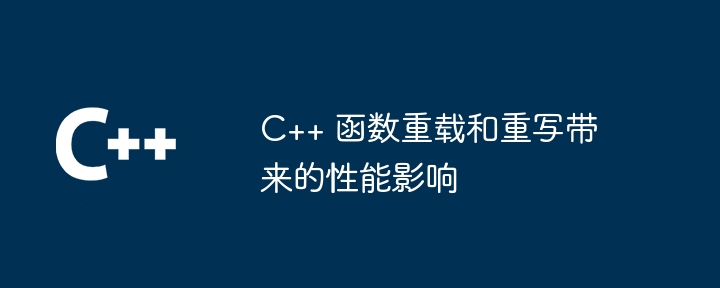函数重载在编译时解析,对性能无影响;函数重写需要运行时动态绑定,引入少量性能开销。

C++ 函数重载和重写带来的性能影响
在 C++ 中,函数重载和函数重写是两种不同的概念,它们对程序的性能有不同的影响。
函数重载
定义:
重载是指具有相同名称但不同参数列表的多个函数。
性能影响:
函数重载在编译时解析,因此不会对程序的执行性能产生任何影响。
实战案例:
int max(int a, int b) {
if (a > b) {
return a;
} else {
return b;
}
}
double max(double a, double b) {
if (a > b) {
return a;
} else {
return b;
}
}
int main() {
int a = 10;
int b = 20;
cout << "最大整数值:" << max(a, b) << endl; // 调用重载的 max(int, int) 函数
double c = 10.5;
double d = 20.5;
cout << "最大浮点值:" << max(c, d) << endl; // 调用重载的 max(double, double) 函数
}
登录后复制
函数重写
定义:
重写是指在子类中重新定义父类中的函数。
性能影响:
函数重写需要在运行时进行动态绑定,因此会引入一些额外的开销。然而,这种开销通常很小,在大多数情况下可以忽略不计。
实战案例:
class Base {
public:
virtual int sum(int a, int b) {
return a + b;
}
};
class Derived : public Base {
public:
int sum(int a, int b) override {
return a + b + 1; // 重写 sum() 函数,在原有基础上加 1
}
};
int main() {
Base base;
Derived derived;
int result1 = base.sum(10, 20); // 调用父类 Base 的 sum() 函数
int result2 = derived.sum(10, 20); // 调用子类 Derived 的重写后的 sum() 函数
}
登录后复制
结论
总的来说,函数重载不会影响程序的性能,而函数重写会引入一些额外的开销。在选择使用函数重载还是函数重写时,开发人员应权衡性能影响和其他因素,例如代码的可读性和可维护性。
以上就是C++ 函数重载和重写带来的性能影响的详细内容,更多请关注叮当号网其它相关文章!
文章来自互联网,只做分享使用。发布者:weapp,转转请注明出处:https://www.dingdanghao.com/article/379695.html


